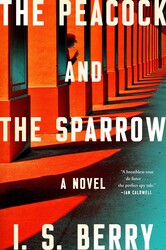I.S. Berry is an author with a rich background and valuable knowledge that allows her to write engaging and compelling stories. We were ecstatic to have the opportunity to interview her, and we hope you find her responses about her new novel, The Peacock and the Sparrow, as fascinating as we do.
TSM: Tell us about your upcoming release, The Peacock and the Sparrow.
ISB: It’s about an aging spy, Shane Collins, who gets caught in the crosswinds of the Arab Spring during his final tour in Bahrain. He becomes entangled in murder, obsessive love, and an unpredictable revolution, and is forced to step off the sidelines and choose a side, ultimately altering the course of history. Looking back, he’s plagued with uncertainty about the decisions he made. It’s a story of the elusiveness of truth, the power and perils of belief, and the burden of unanswered questions.
TSM: What inspired you to write this story?
ISB: It’s the literary culmination of living and working in the Middle East, six years of spying for the CIA, and the things that still haunt me—the loose ends of espionage. Was my informant who he said he was? Did my operation help or hurt people? How much should I compromise myself—and how far should I ask my informant to go? Who and what should I believe?
For the setting, I was inspired by two years of living in Bahrain during the Arab Spring. On this tiny but pivotal island, the country’s Shiite majority has been revolting against the Sunni monarchy for more than a decade, demanding rights, equality, opportunities. Saudi Arabia backs the monarchy; Iran, it’s rumored, backs the revolutionaries. It’s an intricate, nuanced, and multidimensional conflict, quite different from the Cold War, which had clearly defined stakes and players. The Arab Spring, I found, was the perfect prism for the murk and moral convolution of espionage.
Also inspiring were the Persian Gulf’s contrasts—of poverty and wealth, privilege and deprivation, haves and have-nots. The region’s sociopolitical tapestry is so rich and layered; it cried out for a story.
TSM: Reading from Shane’s perspective feels authentic and provides a look into the moral complexities of his profession. What was your process in developing his character?
ISB: I set out to write the most authentic protagonist I could. Complex and messy. Not easily likeable or pat, not slick or polished. Not James Bond. The spy novel genre is filled with Bond types—superhuman characters who embody the glamor of espionage, who can scale roofs or neutralize a villain with a swift chop to the neck. What I feel the genre lacks is characters who reflect the reality of the profession—the darkness, the wear-and-tear, the toll it takes. Collins, an alcoholic divorcé, has been battered by years of manipulation, deceit, and mediocrity—this is the debilitating reality of spying.
Nevertheless, readers will find there’s worth and nuance in Collins. In his own way, he navigates the Arab Spring, tries to do the right thing in a world where good and bad are often indistinguishable. One advance reader wrote that, despite Collins’ flaws, she found herself rooting for him. That’s exactly how I want readers to feel.
Collins is nothing like me, so I really had to inhabit him to write convincingly. I drew character traits from people I’d known and worked with, and fully developed Collins’ backstory before writing. (Not unlike cover stories and aliases in espionage; spies and writers alike must step convincingly into a persona.)
TSM: How has your former work with the CIA influenced your writing? Are there any specific experiences from your background that you draw from in the novel?
ISB: I really tried to capture the feeling of being a spy. The sense of uncertainty, the haunting irresolution. Constant doubt about whom to trust, what’s fact and fiction, when and to what degree to become involved. I served for one year in wartime Baghdad and helped apprehend an alleged terrorist, only to learn he might not be guilty. This plagued me. The Peacock and the Sparrow, in many ways, reflects these extant questions.
I made the tradecraft in my book as authentic as possible. Sometimes fancy gadgets, technology, and concocted tradecraft propel the plot, do the work for you. But I constrained myself to what was real and plausible. Stairstep surveillance detection routes, cover stops, commo plans. Above all, I wanted the reader to understand that tradecraft is essentially psychological, not physical. As Collins says, “Espionage, in the black of night, is about outsmarting your opponent.”
For the armed conflict scenes of the Arab Spring, I drew on my experiences in wartime Baghdad. Buildings like mutilated corpses; tracer fire punctured the evening sky: these are images I witnessed—indelibly etched on my mind—that tumbled onto my pages.
TSM: What do you hope readers take away from the novel?

ISB: I hope readers get a sense of the brume of espionage and our post-Cold War world. Just as Graham Greene illuminated the stakes of the Vietnam War through his characters in The Quiet American, I hope my characters reveal, at a human level, the complexity and stakes of modern international relations and the Arab Spring.
My book is also about the desire to make a dent in the world, step off the sidelines, dispel the sense of futility that too often yokes us. This theme certainly resonated with me; I hope it will ring true for readers.
TSM: Were there any challenges that you faced during the writing process?
ISB: Because I worked for the Agency, I’m obligated to submit any CIA-related writing for classification review before showing it to anyone. So I essentially wrote The Peacock and the Sparrow in a vacuum. It was a lonely and daunting process; no one could give me feedback or cheer me on. At times, it felt like a complete leap of faith: plunging into deep, opaque waters, not knowing what was at the bottom.
TSM: What advice would you give to new aspiring writers?
ISB: Choose a story you love. Writing a book is like a relationship: you’ll spend endless hours in it; at times, it will annoy and frustrate you. So pick a partner you can live with through the ups and downs, that you’ll still want to see in the morning.
Read anything and everything—as much to find what speaks to you as what doesn’t. Think deeply about it all. Let the writers you love marinate and combine in your subconscious until your own voice emerges.
Find what makes your voice distinctive. Don’t try to please everyone. Some people will like your writing; others won’t. If you elicit strong reactions, take it as a sign you’ve written something impactful, that sparks emotion—this, after all, is the essence of writing.
TSM: What other thrillers or authors in the genre do you enjoy? What drew you to the genre?
ISB: I’m drawn to spy novels and thrillers with a more literary flavor. Graham Greene will always be my favorite; The Quiet American is a masterpiece from the first word to the last. The Year of Living Dangerously by C.J. Koch superbly mixes mystery, poetic prose, and history. Ian McEwan’s The Innocent is an elegant, classic spy novel. All the Old Knives by Olen Steinhauer packs a stunning amount of tension into a taut, spare tale.
Since I’m a former spy, espionage novels were a natural fit for me. Writing about tradecraft and operations is second nature; I know these things intimately and instinctively. I know that a spy is never called an “agent” (this term is reserved for informants or sources); I know how to conduct a surveillance detection route, how to use a recognition or safety signal.
I’ve also come to believe that spy novels reflect some of the most fundamental questions we face as humans: what side you’ll fight for; whether ends justify means; where the truth lies.
TSM: And finally, what’s next? Any new projects that you foresee in the future?
ISB: Yes! I’m at work on another spy novel, the first in a series, I hope. A first-tour female case officer accidentally kills a young man while rushing to meet an informant. It’s espionage, so there’s more to the story; in unraveling the truth behind the accident, the officer uncovers decades of secrets—about a muckraking journalist who has mysteriously disappeared inside an embassy, about the complex relationship between the United States and Russia. It’s a post-modern story of betrayal, set against the battle between rising fascism and democracy.

